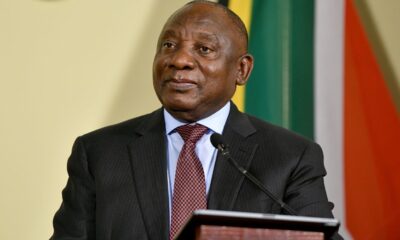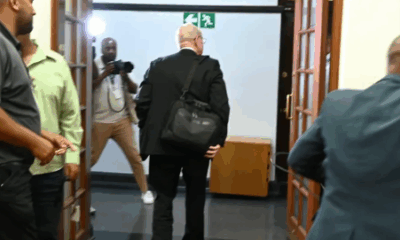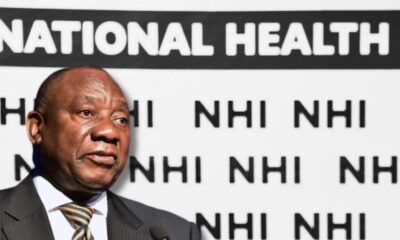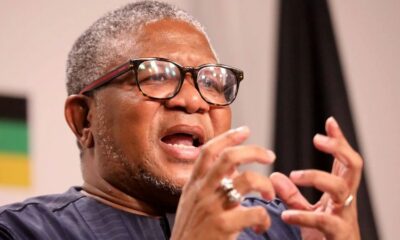News
Ramaphosa Holds the Line on Israel, Refugees, and the Future of US-SA Ties
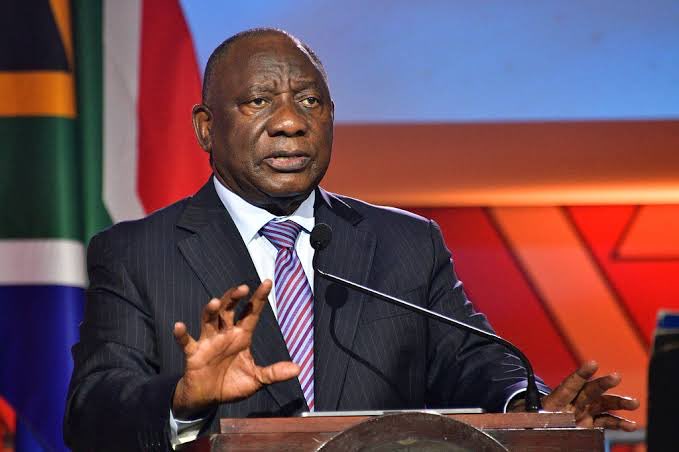
Ramaphosa Pushes Back: No Shift on Israel, No Panic Over US Refugee Claims
Amid global tensions and local political heat, the president is standing firm on South Africa’s foreign policy and pushing back against international narratives painting the country in a distorted light.
In a year already shaped by complex diplomatic chess moves, President Cyril Ramaphosa is refusing to be cornered.
Whether it’s facing tough questions from EFF firebrands in Parliament or navigating a new chapter in US–South Africa relations, Ramaphosa is clear: South Africa’s principles aren’t up for sale.
On Israel: “We’re Not Backing Down”
Responding to parliamentary questions this week, Ramaphosa said no formal request has come from the United States asking South Africa to withdraw or reconsider its genocide case against Israel at the International Criminal Court (ICC).
His words were unequivocal:
“South Africa remains steadfast in its call for an immediate ceasefire, humanitarian access, an end to the occupation, and an end to the collective punishment of Palestinians.”
This continues South Africa’s bold stance that has earned both praise and backlash on the world stage. For many citizens, particularly those involved in student and faith-based solidarity groups, the government’s position has become a point of national pride.
Yet, it has also risked friction with allies like the United States, particularly under the volatile leadership of President Donald Trump, now back in the White House.
Refugee Politics: Trump’s Afrikaner Gambit
In February 2025, Trump signed an executive order granting refugee status to white Afrikaner South Africans, citing supposed persecution. It stirred outrage in Pretoria and sparked a global media frenzy.
EFF leader Julius Malema pushed Ramaphosa on the issue, asking whether the president had received any communication from Trump walking back claims of “white genocide” in South Africa.
Ramaphosa said no, but that South Africa had pushed back diplomatically via DIRCO and its embassy in Washington.
“We made it clear that refugee determinations are based on facts. Allegations of discrimination in South Africa are unfounded, and do not meet the legal threshold for persecution under refugee law.”
That’s the legal angle. But culturally, this move by Trump has reawakened deep racial sensitivities in South Africa, particularly among communities who feel the narrative ignores the country’s actual dynamics and progressive constitutional framework.
Resetting Relations: A Visit With Strings Attached
Ramaphosa’s recent May 2025 visit to the United States was framed as a chance to “reset” ties. He confirmed that no taxpayer money was used for non-government guests and that the delegation included a carefully chosen group of business leaders, labour representatives, and senior officials.
Importantly, he revealed that his talks with Trump did not cover controversial US domestic issues like the abolition of diversity and inclusion programs or reparations, topics some expected would surface.
“The visit was about South Africa’s interests our economy, our diplomacy, our trade partnerships,” Ramaphosa clarified. “Not about weighing in on internal US culture wars.”
Still, many critics argue that avoiding those topics signals a missed opportunity to advocate for global racial justice, something South Africa historically champions.
The Curious Case of the Presidential Envoy
Adding to the intrigue is Mcebisi Jonas, the man Ramaphosa appointed in April as Presidential Envoy to the US following the quiet removal of former ambassador Ebrahim Rasool.
But months into his new role, Jonas has yet to make an official trip to Washington.
That revelation came from International Relations Minister Ronald Lamola, who told Parliament that special envoy work is confidential and not meant for public updates or scrutiny.
Still, opposition MPs are asking questions: What exactly is Jonas doing? Why hasn’t he engaged directly with US counterparts? Is South Africa’s diplomatic bench too thin during a crucial period?
For now, those answers remain behind closed doors.
Bigger Than Politics: What This Means for South Africa
At the heart of all this is a country trying to balance its moral voice with its strategic interests. South Africa wants to stand firm on Palestine, challenge misinformation around race relations, and keep a functional trade relationship with a powerful, if unpredictable, ally.
But the real tension isn’t just diplomatic, it’s identity-based.
Can South Africa maintain its global role as a voice of justice, while avoiding economic fallout?
Can Ramaphosa satisfy local pressure from groups like the EFF, while keeping things civil with Trump?
These questions will shape much of the country’s foreign policy narrative heading into 2026.
Public Sentiment: Pride, Skepticism, and Fatigue
Reactions across the country have been mixed.
-
Pro-Palestine activists applauded Ramaphosa’s continued support for Gaza, calling it “the right side of history.”
-
Others, particularly in business circles, expressed concern that public clashes with Washington could hurt economic partnerships and investor confidence.
-
Meanwhile, political analysts noted a growing public fatigue with high-level diplomacy that doesn’t seem to deliver much tangible benefit at home.
Still, Ramaphosa’s measured tone and refusal to capitulate to foreign pressure is earning him quiet praise, even from unlikely quarters.
What’s Next?
With a new ambassador to the US still pending and South Africa’s stance on Israel unchanged, the next few months will be critical.
-
Will Mcebisi Jonas engage meaningfully with Washington?
-
Will Ramaphosa continue to walk the diplomatic tightrope with Trump?
-
Will South Africa’s foreign policy remain values-driven in a climate of realpolitik?
For now, South Africa is not flinching. It’s watching. It’s waiting. And, according to Ramaphosa, it’s sticking to its principles.
“We may not be the biggest or the loudest,” he said. “But we know who we are and what we stand for.”
{Source: IOL}
Follow Joburg ETC on Facebook, Twitter , TikTok and Instagram
For more News in Johannesburg, visit joburgetc.com



